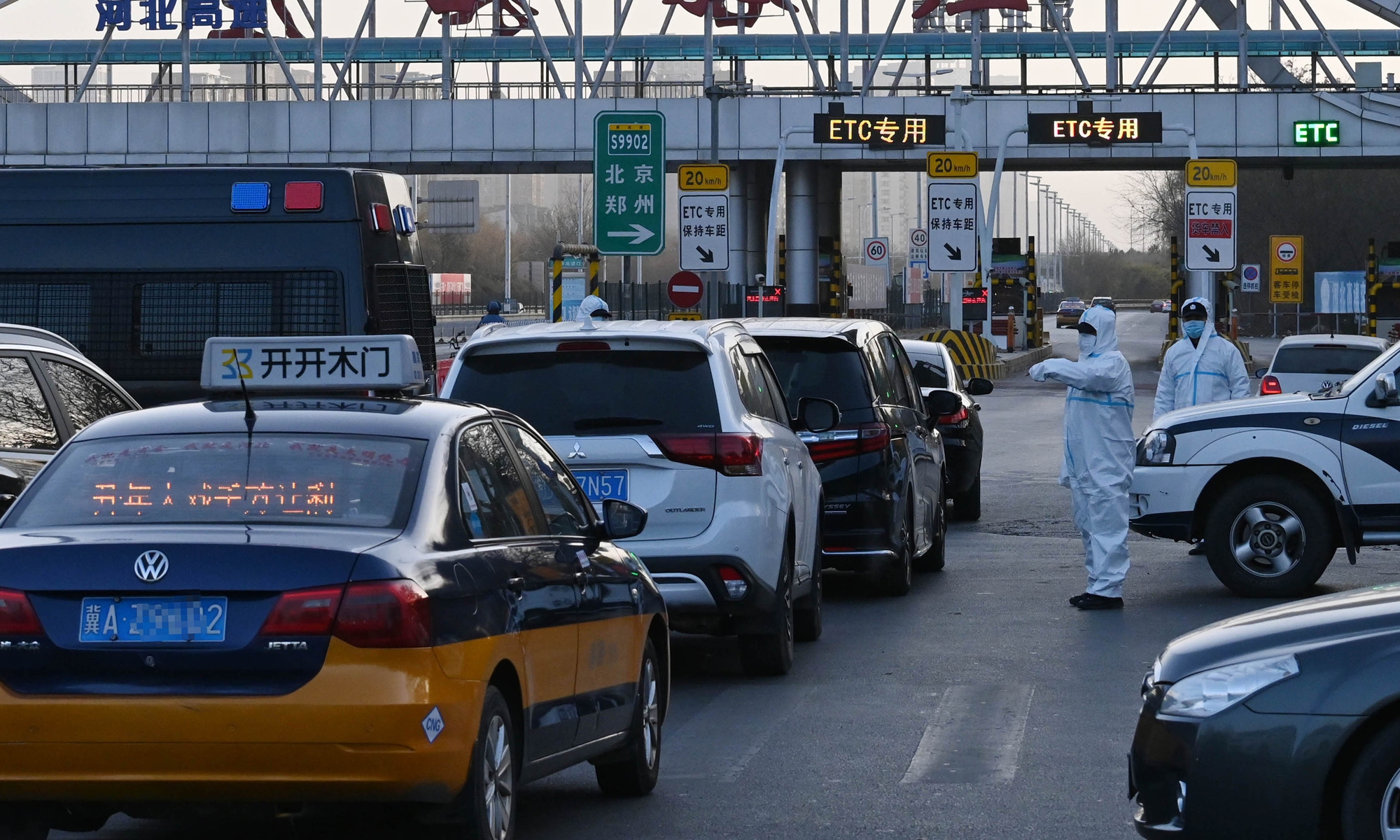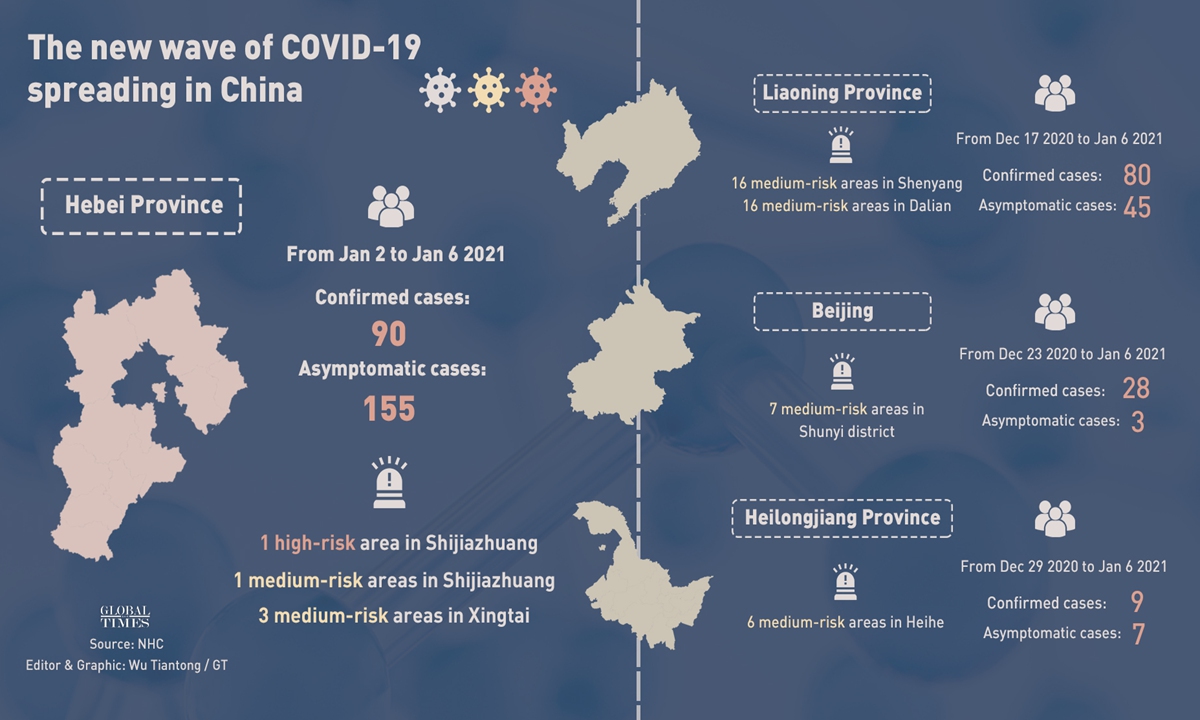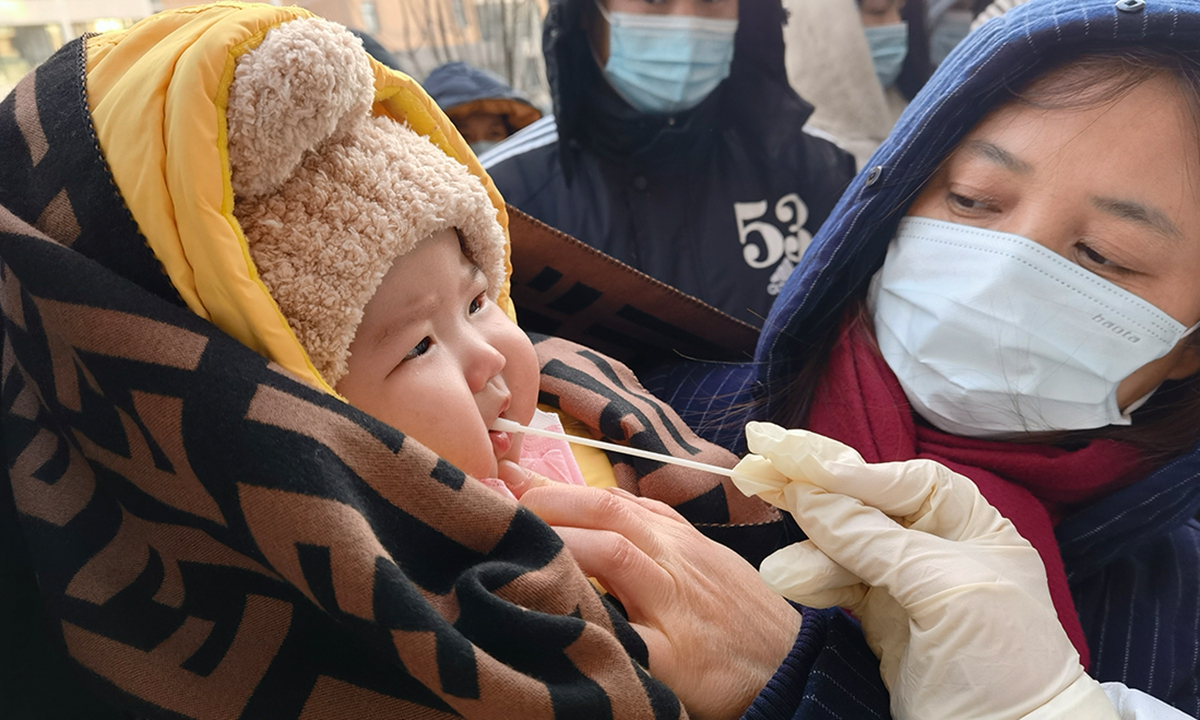
Local police reroute motorists at a highway crossing in Shijiazhuang, capital of Hebei Province on Wednesday. Shijiazhuang launched comprehensive nucleic acid testing on its residents. Photo: cnsphoto
Just one night after announcing it was entering the "wartime mode," North China's Hebei Province, which neighbors Chinese capital Beijing, began putting in place various COVID-19 prevention measures on Wednesday amid a sudden spike in coronavirus infections, including controls on highways passing through Hebei leading to Beijing and other provinces, stopping sales of railway tickets to Beijing, suspending classes in schools, implementing closed-off managements in residential communities in provincial capital Shijiazhuang, and taking sweeping nucleic acid tests.
Hebei reported 20 new confirmed COVID-19 cases and 43 asymptomatic cases on Tuesday, making it the place with the most daily newly added cases in China. Among all the cases, 19 confirmed ones and 41 asymptomatic ones are from Shijiazhuang the provincial capital.
On Wednesday, Hebei announced to name Shijiazhuang's Gaocheng district a high-risk area, currently the only one in China. Hebei now also has three medium-risk areas in Nangong, a small city about 126 kilometers south of Shijiazhuang.
As a province that neighbors China's capital Beijing, Hebei has strengthened overall prevention measures since Wednesday - one night after it announced it was entering "wartime mode" and suspended all classes in the city's schools on Tuesday night.
As of press time on Wednesday, Hebei was implementing controls on 10 highways that connect Shijiazhuang with Beijing and other adjacent provinces. Traffic police are urging vehicles on highways from both sides to turn back. Cities in Hebei, including Shijiazhuang, Xingtai and Handan, both located south of Shijiazhuang, have stopped selling railway tickets to Beijing from Wednesday to Friday.
The Long-Distance Bus Transit Station of Shijiazhuang also announced Wednesday it was suspending operations due to the COVID-19 flare-up.
Although not implementing a total lockdown as Wuhan did in January 2020, Hebei is the latest Chinese region to impose rare strict and overall prevention measures against the COVID-19 after China had put the epidemic under control. In July 2020, Urumqi, capital city of Northwest China's Xinjiang Uygur Autonomous Region, also implemented the closed-off management to deal with a spike in infections.
On Wednesday, Beijing health authorities also reminded people who had lived in or traveled to high-risk areas such as Shijiazhuang and Xingtai since December 10, 2020 to report to their community and their workplace immediately, and follow the necessary epidemic control measures.

The new wave of COVID-19 spreading in China, Jan 6 Infographic: GT
The Global Times also learned that Shijiazhuang has organized residents to undergo mass nucleic acid testing from Wednesday. Residential communities began to implement closed-off management on Wednesday morning.
Residents from Shijiazhuang confirmed with the Global Times on Wednesday that they have been notified by residential communities that the closed-off management will last for three days and many people have been stocking up on food in preparation.
Some residents reached by the Global Times do not seem too worried about the current situation. They said that except for not being able to go outside, everything remains normal and things might be brought under control again soon after the mass nucleic acid tests.
The Global Times also learned that except for Nangong, which has put in place closed-off management measures, other places in Xingtai, which has jurisdiction over Nangong, are strengthening prevention measures but currently have not asked all residents to stay at home. Mass nucleic acid tests in the city had begun as early as Tuesday.
An official surnamed Hu from Xingtai told the Global Times that some residential communities in Xingtai have taken temporary closed-off management measures to take nucleic acid tests. "Things may return to normalcy after the mass nucleic acid tests in three days."
"The current situation is tense, as staff turnover within the province is high… Some residents seemed to be worried and are waiting at home for the nucleic acid tests," Hu said.
Unlike Shijiazhuang, which has suffered more severe infections, schools in Xingtai have been open as usual. A teacher from a middle school in Xingtai, who asked for anonymity, told the Global Times that the school has been notified to make preparations for nucleic acid testing at around 8:00 am on Wednesday. The tests began from 10:00 am and were completed in around two hours after taking samples from more than 3,000 people.
Teaching staff and students remained relaxed about the current situation as the school has taken strict prevention measures after infections emerged in Nangong and Shijiazhuang earlier, according to the teacher.
The Global Times has learned that some students were absent from class in Xingtai on Wednesday, as some villages which could be related to confirmed cases have put in pace closed-off management measures.

An 8-month-old child from Shijiazhuang, Hebei Province, undergoes a nucleic acid test on Wednesday as the province organizes sweeping nucleic acid tests from Wednesday to Friday. Photo: Courtesy of Zhao Jing
Moat for capitalThe sudden spike in infections in Hebei Province, seen as a "moat for Beijing the capital," has attracted national attention due to the fast-growing number of daily confirmed and asymptomatic cases - from the one confirmed case on January 2 to 19 confirmed and 43 asymptomatic cases on Tuesday.
Senior officials in Hebei required cities in the province to bring the outbreak under control as soon as possible to prevent infections from spreading to other regions or to Beijing and to firmly play the role of a "political moat for the capital city," according to Hebei Daily.
Feng Zijian, deputy director of the Chinese Center for Disease Control and Prevention (China's CDC), told China Central Television on Tuesday night that the CDC had sent expert teams to Shijiazhuang and Xingtai, where the infections emerged. Given the still increasing number of infections, the virus must have been stealthily spreading for a while, he noted.
The coronavirus strain causing the newly confirmed COVID-19 cases in Hebei has been determined to be an imported one, very likely from Europe, Feng said. The throat swab sample of the first newly confirmed COVID-19 case has been sent to China's CDC for virus gene sequencing, which will trace the source of infection as soon as possible.
Wang Guangfa, a respiratory expert at Peking University First Hospital, told the Global Times on Wednesday that the epidemic could easily spread to Beijing from Hebei, as the province geographically surrounds the capital and exchanges in the region are very close.
"But we are not saying that a certain region is more important than another. The key issue that we are facing now is to stop the epidemic right in the place where it occurs, and prevent it from spreading to more areas," Wang said.
COVID-19 reappearing in a certain region is an inevitable phenomenon as the entire society enters a new normal of epidemic control, Wang said. "We need to have a balancing point between normal social life and disease control. And the bottom line is that we can monitor the spread of the epidemic in a timely manner and bring it under control quickly."
Amid the still developing epidemic in Hebei, some residents questioned whether the provincial government had been incompetent in dealing with the spread, for example, why there had no press conference to inform the public on the epidemic development from January 2 to Monday.
A Shijiazhuang resident surnamed Zhao told the Global Times that the local government should have responded to the outbreak more quickly and released information before unofficial messages had gone viral.
On Tuesday, Shijiazhuang held its first press conference, three days after the first case appeared on January 2. It was delayed for two hours for unknown reasons and offered little information on the current situation, which faced online criticism.
According to a news outlet affiliated to the Beijing Youth Daily, the late Tuesday conference was held after the national expert team sent by the national CDC and National Health Commission (NHC) arrived in the province.
During a meeting with senior Hebei officials, including Hebei Party chief Wang Dongfeng and provincial governor Xu Qin, on Tuesday, Ma Xiaowei, director of the NHC, said that the epidemic in Hebei is still in the developing stage, and the situation is severe. "We must have mental and concrete preparations to fight the severe epidemic situation… and to work in a more detailed way," according to the news outlet.
Ma also said the province should strengthen releasing information and report the epidemic in accordance with laws and regulations.
Responding to a question on whether Hebei had begun a detailed epidemiological investigation, Wang said that epidemiological investigation is very complicated work, and involves investigating each individual case, the case's trajectory, social contacts, and the things that patients came into contacts with. Wang appealed to the public to wait for the results.
He noted that currently, an in-depth epidemiological investigation is still required to find out how the epidemic in Hebei occurred and whether there are loopholes in the province's epidemic control.
As Hebei is busy working to prevent the epidemic from spreading to Beijing, the Chinese capital itself has also taken preventive measures.
Beijing Party chief Cai Qi said on Tuesday that management and control of travel from Hebei to Beijing will be strengthened to ensure the safety of the capital.
On Wednesday, Beijing health authorities reminded residents who had lived or traveled to high-risk areas such as Shijiazhuang and Xingtai in Hebei since December 10 to report to their community and workplaces immediately.
An employee from the Liulihe inspection station, a hub of Beijing-Shijiazhuang section of the G4 Expressway located at the Heibei-Beijing border, told the Global Times on Wednesday that all passengers from low-risk regions have to swipe their personal ID cards to register at checkpoints and show a negative nucleic acid test certificate within the validity period of three days."We will also check passengers' information with their companies and their residential communities," said the employee, who requested anonymity.
A community staff of Balizhuang sub-district in Beijing's Chaoyang district told the Global Times that people coming from Xingtai and Shijiazhuang need to register to the community in advance and then undergo home isolation quarantine.
Chaoyang district on Tuesday said it will conduct a comprehensive screening of arrivals from medium-high risk areas to Beijing and carefully conduct health monitoring.
"Depending on the situation, it is also possible for passengers from medium-high risk areas in Hebei to undergo two or three more nucleic acid tests after arriving in Beijing," the community staff said.
Lessons to be learnedGiven the fact that this resurgence involved cluster infections in villages in Hebei and some confirmed cases were found to have attended several wedding ceremonies in a row, experts called for group activities to be kept to a minimum, especially in villages and counties, where residents tend to get together to celebrate before and during the Spring Festival holidays. They also reminded local governments at all levels to keep a high alert and avoid a fluke mentality over a possible resurgence, as the virus spreads easily and quickly in winter and the risk brought about by imported cases and cold-chain products remains high.
Asked if Hebei should implement overall closed-off management, Yang Zhanqiu, deputy director of the pathogen biology department at Wuhan University, said that there is no need to close off the entire province as was done in Wuhan in January 2020.
"Back at the beginning of 2020, we knew little about the virus and locking down Wuhan was the last resort as the situation was severest there. But we now have so many measures to bring the situation under control. There is no need to press the pause button for any place," Yang said.
He noted that if sporadic cases across China are still rampant at the end of January, it will be time to take stricter measures to reduce mass movement during the Spring Festival holidays.
During the Spring Festival season, Chinese people travel back to their hometowns to visit their families and join gatherings with relatives and friends. As a result, the flow of people will grow significantly, which will increase the risk of respiratory disease infections, especially during the winter when the low temperature induces higher infection risk, Yang Weizhong, dean of the school of population medicine and public health of Peking Union Medical College Hospital, told the Global Times.
"The epidemic control situation becomes most severe in winter. I personally hope that people can stay at home and not travel unless it is necessary," Yang said. "If you have to, you must wear a mask properly, wash hands frequently, and maintain social distancing."






